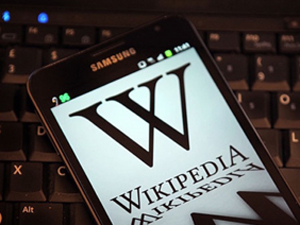



Date:22/09/17
 Remember when your teacher told you Wikipedia wasn’t a legitimate source?
Remember when your teacher told you Wikipedia wasn’t a legitimate source?
Well, it’s a source for legitimate scientists, according to a new study.
Neil C. Thompson, from Massachusetts Institute of Technology’s Sloan School of Management, and Douglas Hanley from the University of Pittsburgh, recently studied “the power of Wikipedia.”
The online encyclopedia is the fifth most used website in the world, according to Alexa Internet, a web traffic data site, and it has an impact on more than just middle school reports. In fact, it can have a “profound impact on scientific literature,” according to the study, published Wednesday.
It’s already clear that Wikipedia reflects science, according to the researchers, because the site has .5 to 1 million scientific articles, representing one article for approximately every 120 scientific journal articles. But they wondered if it also shaped the science.
“Do scientists read Wikipedia articles and encounter news ideas? Or perhaps scientists encounter ideas on Wikipedia that they are already aware of, but which are brought together in a way that influences how they think about them?” the study reads. “A further possibility is that a scientist could lack access to costly journals, and thus the appearance of an idea on Wikipedia could be that person’s only access to that scientific knowledge.”
For the study, Thompson and Hanley commissioned graduate students in chemistry to create new Wikipedia articles on scientific topics that weren’t mentioned on the online encyclopedia. Then, a random half was added to Wikipedia and the other half were not.
The articles that made it to Wikipedia got thousands of views per month, according to the study. Later, it was found that researchers writing scientific literature were more likely to use the words from those uploaded articles, rather than the ones that weren’t uploaded.
“Incorporating ideas into a Wikipedia article leads to those ideas being used more in the scientific literature,” the study reads.
The practice may make science more inclusive to people who don’t have access to academic journals, since it’s a free source. Wikipedia doesn’t necessarily prompt new, cutting-edge research, the study notes, but has a substantial effect on follow-up scientific work.
“Our research shows that scientists are using Wikipedia and that it is influencing how they write about the science that they are doing," Thompson said in a statement. "Wikipedia isn't just a record of what's going on in science, it's actually helping to shape science."
Scientists use Wikipedia, too, according to new study
 Remember when your teacher told you Wikipedia wasn’t a legitimate source?
Remember when your teacher told you Wikipedia wasn’t a legitimate source?Well, it’s a source for legitimate scientists, according to a new study.
Neil C. Thompson, from Massachusetts Institute of Technology’s Sloan School of Management, and Douglas Hanley from the University of Pittsburgh, recently studied “the power of Wikipedia.”
The online encyclopedia is the fifth most used website in the world, according to Alexa Internet, a web traffic data site, and it has an impact on more than just middle school reports. In fact, it can have a “profound impact on scientific literature,” according to the study, published Wednesday.
It’s already clear that Wikipedia reflects science, according to the researchers, because the site has .5 to 1 million scientific articles, representing one article for approximately every 120 scientific journal articles. But they wondered if it also shaped the science.
“Do scientists read Wikipedia articles and encounter news ideas? Or perhaps scientists encounter ideas on Wikipedia that they are already aware of, but which are brought together in a way that influences how they think about them?” the study reads. “A further possibility is that a scientist could lack access to costly journals, and thus the appearance of an idea on Wikipedia could be that person’s only access to that scientific knowledge.”
For the study, Thompson and Hanley commissioned graduate students in chemistry to create new Wikipedia articles on scientific topics that weren’t mentioned on the online encyclopedia. Then, a random half was added to Wikipedia and the other half were not.
The articles that made it to Wikipedia got thousands of views per month, according to the study. Later, it was found that researchers writing scientific literature were more likely to use the words from those uploaded articles, rather than the ones that weren’t uploaded.
“Incorporating ideas into a Wikipedia article leads to those ideas being used more in the scientific literature,” the study reads.
The practice may make science more inclusive to people who don’t have access to academic journals, since it’s a free source. Wikipedia doesn’t necessarily prompt new, cutting-edge research, the study notes, but has a substantial effect on follow-up scientific work.
“Our research shows that scientists are using Wikipedia and that it is influencing how they write about the science that they are doing," Thompson said in a statement. "Wikipedia isn't just a record of what's going on in science, it's actually helping to shape science."
Views: 437
©ictnews.az. All rights reserved.Similar news
- Azerbaijani project to monitor disease via mobile phones
- Innovative educational system to be improved under presidential decree
- NTRC prolongs license of two TV and radio organizations for 6 years
- Azerbaijan establishes e-registry for medicines
- Azerbaijani museum introduces e-guide
- Nar Mobile opens “Nar Dunyasi” sales and service center in Siyazan city
- International conference on custom electronic services held in Baku
- OIC secretary general to attend COMSTECH meeting in Baku
- Azerbaijan develops earthquake warning system
- New law to regulate transition to digital broadcasting in Azerbaijan
- Azerbaijani State Social Protection Fund introduces electronic digital signature
- Intellectual traffic management system in Baku to be commissioned in December
- Tax Ministry of Azerbaijan started receiving video-addresses
- World Bank recommends Azerbaijan to speed up e-service introduction in real estate
- Azerbaijan to shift to electronic registration of real estate





















